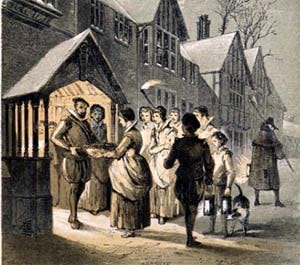12 Days of Christmas Carols- Here We Come A-wassailing

Guest Post by Steven Wedgeworth
The Christmas season concludes with Twelfth Night. Associated with merrymaking and even mischief, Twelfth Night serves as a bridge between Christmas and Epiphany. It seems appropriate then to finish up our survey of Christmas Carols with a wassailing song. Wassailing was a practice that, in some ways, goes back to pre-Christian Europe, but took on most of its popularity in the middle ages. It involved door-to-door caroling and, of course, the drinking of wassail. “Wassail” is actually an expression, of Anglo-Saxon and possibly older Norse origins, which means “be hale” or “be healthy.” The name was transferred to the drink, typically a hot mulled cider, over the years as people would offer “Wassail” as a toast. And so the tradition of wassailing was that of door-to-door caroling with the drinking of wassail and the wishing of God’s blessing upon the residents of the house, and it was typically done on Twelfth Night.
Of course, wassailing also took on some other associations. Much like certain later Halloween customs, the wassailers began asking for gifts and treats in return for their well-wishing. They wanted more wassail, some beer, and even that famous “figgy pudding.” The gift was a sort of reward for the singing, but it also became an incentive and attracted more and more children from about the town. And you can imagine, as the night went on and the wassail drunk more and more, the carolers could become a bit rowdy. Indeed, they might start demanding more and more treats, threatening violence and proclaiming, “We won’t go until we get some, so bring it right here!” This led to a moderate amount of social unrest, and it gave the end of the Christmas season and Twelfth Night a rather sordid reputation.
Twelfth Night also involved various role-reversal parties, masquerade balls, and all-around rambunctiousness. For this and a few other reasons, the Puritans eventually outlawed the whole thing, Christmas included. It wasn’t until a Romanticized and more sanitized version of “Merrie Olde England” made a comeback through the literary efforts of the Victorians and the new customs of their royalty, that the Christmas traditions we all think of today became normative. Wassailing turned into a simply fun community activity, something for the whole family, bearing only slight reminders of that obstreperous past.
“Here We Come A-wassailing” is a great example of this reinvention of tradition, as it tells the story of poor neighborhood children singing, asking for beer, money, and food, and wishing God’s blessing upon the house. It omits any reference to theft, violence, vandalism, or general naughtiness, and it can now be sung by the London Philharmonic. The song became popular around the middle of the 19th cent., though it probably has roots going back a few hundred years earlier. Its last stanza adds an element of social consciousness to the carol. As if channeling Dickens, “Here We Come A-wassailing” reminds all who celebrate Christmas to remember the poor and give charitably during this season.
Here we come a-wassailing
Among the leaves so green;
Here we come a-wand’ring
So fair to be seen.Refrain:
Love and joy come to you,
And to you your wassail too;
And God bless you and send you a Happy New Year
And God send you a Happy New Year.Our wassail cup is made
Of the rosemary tree,
And so is your beer
Of the best barley.Refrain
We are not daily beggars
That beg from door to door;
But we are neighbours’ children,
Whom you have seen before.Refrain
Call up the butler of this house,
Put on his golden ring.
Let him bring us up a glass of beer,
And better we shall sing.Refrain
We have got a little purse
Of stretching leather skin;
We want a little of your money
To line it well within.Refrain
Bring us out a table
And spread it with a cloth;
Bring us out a mouldy cheese,
And some of your Christmas loaf.Refrain
God bless the master of this house
Likewise the mistress too,
And all the little children
That round the table go.Refrain
Good master and good mistress,
While you’re sitting by the fire,
Pray think of us poor children
Who are wandering in the mire.Refrain
Steven Wedgeworth is the pastor of Christ Church in Lakeland, FL. He is also a founder and general editor of The Calvinist International.
The post 12 Days of Christmas Carols- Here We Come A-wassailing appeared first on Kuyperian Commentary.

